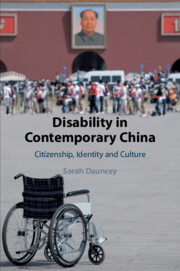Book contents
- Disability in Contemporary China
- Disability in Contemporary China
- Copyright page
- Dedication
- Contents
- Figures
- Acknowledgements
- A Note on Language
- Abbreviations
- Introduction
- 1 Where Did All the Disabled People Go?
- 2 Backstage to Centre Stage
- 3 Entertainment or Education?
- 4 A Narrative Prosthesis?
- 5 Blind, but Not in the Dark
- 6 Private Lives for Public Consumption
- Conclusion
- References
- Index
Conclusion
The Perils and Possibilities of Para-citizenship
Published online by Cambridge University Press: 18 September 2020
- Disability in Contemporary China
- Disability in Contemporary China
- Copyright page
- Dedication
- Contents
- Figures
- Acknowledgements
- A Note on Language
- Abbreviations
- Introduction
- 1 Where Did All the Disabled People Go?
- 2 Backstage to Centre Stage
- 3 Entertainment or Education?
- 4 A Narrative Prosthesis?
- 5 Blind, but Not in the Dark
- 6 Private Lives for Public Consumption
- Conclusion
- References
- Index
Summary
The book concludes that, while there might be many areas of common experience, the ways in which disabled identities and citizenship are constituted and imagined in China might equally be a world away from those envisaged and experienced elsewhere. Theories of disability provide extremely useful tools for decoding the evidence we find, yet they can only take us so far as the various comparative lenses inherent in them inevitably leave China wanting. Proposing a broader conceptualisation of citizenship – para-citizenship – that acknowledges both the structural rules and resources that shape social systems and the individuals (and groups) within them, as well as the agency that enables individuals (and groups) to identify and respond to, or draw on, these particular power relationships, offers an approach that can encapsulate the diversity of disabling structures and disabled experiences, as well as reflect their fluidity and dynamism. And, with a much firmer understanding of disability in China’s recent past, we can begin to see how new forms of para-citizenship might be re-imagined in future, particularly as China transforms from within and opens up further to outside influences.
- Type
- Chapter
- Information
- Disability in Contemporary ChinaCitizenship, Identity and Culture, pp. 186 - 193Publisher: Cambridge University PressPrint publication year: 2020



